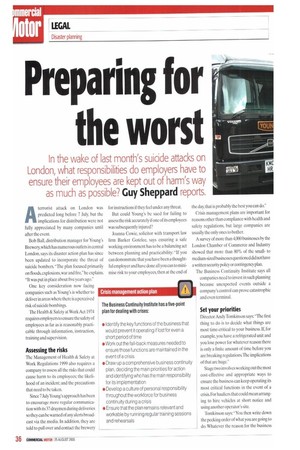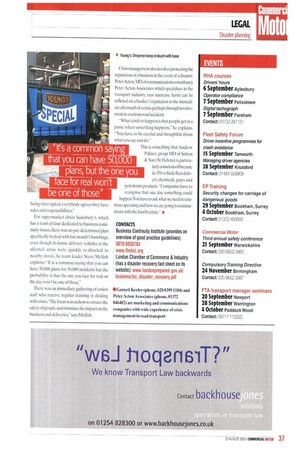Preparing for the worst
Page 40

Page 41

If you've noticed an error in this article please click here to report it so we can fix it.
In the wake of last month's suicide at-tacKs on
London, what responsibilities do employers have to ensure their employees are kept out of harm's way as much as possible? Guy Sheppard reports.
Aterrorist attack on London was predicted long before 7 July, but the implications for distribution were not fully appreciated by many companies until after the event.
Bob Ball, distribution manager for Young's Brewery, which has numerous outlets in central London, says its disaster action plan has since been updated to incorporate the threat of suicide bombers. The plan focused primarily on floods, explosions, war and fire," he explains. "It was put in place about five years ago."
One key consideration now facing companies such as Young's is whether to deliver in areas where there is a perceived risk of suicide bombings.
The Health & Safety at Work Act 1974 requires employers to ensure the safety of employees as far as is reasonably practicable through information, instruction, training and supervision.
Assessing the risks
The Management of Health & Safety at Work Regulations 1999 also requires a company to assess all the risks that could cause harm to its employees; the likelihood of an incident; and the precautions that need to be taken.
Since 7 July Young's approach has been to encourage more regular communication with its 37 draymen during deliveries so they can be warned of any alerts broadcast via the media. In addition, they are told to pull over and contact the brewery for instructions if they feel under any threat.
But could Young's be sued for failing to assess the risk accurately if one of its employees was subsequently injured?
Joanna Cowie, solicitor with transport law firm Barker Gotelee, says ensuring a safe working environment has to be a balancing act between planning and practicability: "If you can demonstrate that you have been a thoughtful employer and have done all you can to minimise risk to your employees, then at the end of the day, that is probably the best you can do."
Crisis management plans are important for reasons other than compliance with health and safety regulations, but large companies are usually the only ones to bother.
A survey of more than 4,000 businesses by the London Chamber of Commerce and Industry showed that more than 80% of the smallto medium-sized businesses questioned did not have a written security policy or contingency plan.
The Business Continuity Institute says all companies need to invest in such planning because unexpected events outside a company's control can prove catastrophic and even terminal.
Set your priorities
Director Andy Tom kinson says: "The first thing to do is to decide what things are most time-critical to your business. If, for example, you have a refrigerated unit and you lose power for whatever reason there is only a finite amount of time before you are breaking regulation s. The implications of that are huge."
Stage two involves working out the most cost-effective and appropriate ways to ensure the business can keep operating its most critical functions in the event of a crisis. For hauliers that could mean arranging to hire vehicles at short notice and using another operator's site.
Tomkinson says: "You then write down the pecking order of what you are going to do. Whatever the reason for the business being interrupted, everybody agrees they have roles and responsibilities."
For supermarket chain Sainsbury's, which has a team of four dedicated to business continuity issues, there was no pre-determined plan specifically to deal with last month's bombings, even though its home delivery vehicles in the affected areas were quickly re-directed to nearby stores. As team leader Steve Mellish explains: "It is a common saying that you can have 50.000 plans for 50,000 incidents but the probability is that the one you face for real on the day won't be one of those."
There was an immediate gathering of senior staff who receive regular training in dealing with crises."'Ilie focus was on how to ensure the safety of people and minimise the impact on the business and deliveries," says Mellish. Crisis management also involves protecting the reputation of a business in the event of a disaster. PeterActon,MD of communications consultancy Peter Acton Associates which specialises in the transport industry, says immense harm can be inflicted on a haulier's reputation in the immediate aftermath of a crisis,perhaps through involvement in a serious road accident.
"What tends to happen is that people get in a panic when something happens," he explains. "You have to be careful and thoughtful about what you say and do."
This is something that Andrew Palmer, group MD of Sutton & Son (St Helens) is particularly conscious of because its 350-vehicle fleet delivers chemicals, gases and petroleum products: "Companies have to recognise that one day something could happen.You have to ask what we need to continue operating and how we are going to communicate with the fourth estate." • Business Continuity Institute (provides an overview ol good practice guidelines) 0870 6038783 www.thehci.org London Chamber of Commerce & Industry (has a disaster recovery fact sheet on its website): www.londonprepared.gov.uk/ business/lcc_disaster jecovery.pdf 'Garnett Keeler (phone, 020 8399 1184) and Peter Acton Associates (phone, 01372 846482) are marketing and communications companies with wide experience of crisis management in road transport






























































































































































































